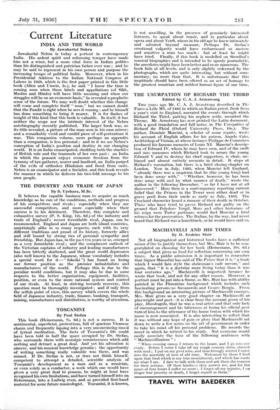INDIA AND THE WORLD
Current Literature
By Jawaharlal Nehru
Jawaharlal Nehru is today a portent in contemporary India. His ardent spirit and reforming temper have made him not a wiser, but a more vital force in Indian politics than his distinguished and patrician father ever was ; and he may be said to represent in his own person and purpose the increasing tempo of political India. Moreover, when in his Presidential Address to the Indian National Congress at Lahore in 1929, which is the first paper printed in this little book (Allen and Unwin, 5s.), he said " I know the time is coming soon when these labels and appellations (of Sikh, Muslim and Hindu) will have little meaning and when our struggles will be on an economic basis," he revealed a prophetic sense of the future. We may well doubt whether this change will come and complete itself soon," but we cannot doubt that the Pandit is right when he sees it coming : and he himself has done something to bring it nearer. It is for flashes of insight of this kind that this book is valuable. In itself, it has neither the scope nor the intrinsic interest of the Nehru autobiography recently published. The larger book was, as its title revealed, a picture of the man seen in his own mirror; and a remarkably vivid and candid piece of self-portraiture it was. This companion volume, more perhaps an appendix than a companion, is less personal ; and in it we see Nehru's conception of India's position and destiny in our changing world. It is an India emancipated, shedding both the shackles of British rule and the trammels of her own past ; an India in which the peasant enjoys economic freedom from the tyranny of tax-gatherer, usurer and landlord, an India purged of the evils of orthodox Hinduism and freed from caste. Nehru is an emancipator and a Socialist, and this book reveals the manner in which he delivers his two-fold message to his own people.






































 Previous page
Previous page